Zika Virus Antagonizes Type I Interferon Responses during Infection of Human Dendritic Cells
- PMID: 28152048
- PMCID: PMC5289613
- DOI: 10.1371/journal.ppat.1006164
Zika Virus Antagonizes Type I Interferon Responses during Infection of Human Dendritic Cells
Abstract
Zika virus (ZIKV) is an emerging mosquito-borne flavivirus that is causally linked to severe neonatal birth defects, including microcephaly, and is associated with Guillain-Barre syndrome in adults. Dendritic cells (DCs) are an important cell type during infection by multiple mosquito-borne flaviviruses, including dengue virus, West Nile virus, Japanese encephalitis virus, and yellow fever virus. Despite this, the interplay between ZIKV and DCs remains poorly defined. Here, we found human DCs supported productive infection by a contemporary Puerto Rican isolate with considerable variability in viral replication, but not viral binding, between DCs from different donors. Historic isolates from Africa and Asia also infected DCs with distinct viral replication kinetics between strains. African lineage viruses displayed more rapid replication kinetics and infection magnitude as compared to Asian lineage viruses, and uniquely induced cell death. Infection of DCs with both contemporary and historic ZIKV isolates led to minimal up-regulation of T cell co-stimulatory and MHC molecules, along with limited secretion of inflammatory cytokines. Inhibition of type I interferon (IFN) protein translation was observed during ZIKV infection, despite strong induction at the RNA transcript level and up-regulation of other host antiviral proteins. Treatment of human DCs with RIG-I agonist potently restricted ZIKV replication, while type I IFN had only modest effects. Mechanistically, we found all strains of ZIKV antagonized type I IFN-mediated phosphorylation of STAT1 and STAT2. Combined, our findings show that ZIKV subverts DC immunogenicity during infection, in part through evasion of type I IFN responses, but that the RLR signaling pathway is still capable of inducing an antiviral state, and therefore may serve as an antiviral therapeutic target.
Conflict of interest statement
The authors have declared that no competing interests exist.
Figures

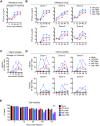
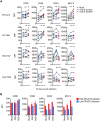

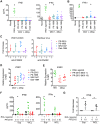
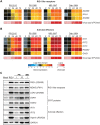

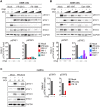
Similar articles
-
STAT5: a Target of Antagonism by Neurotropic Flaviviruses.J Virol. 2019 Nov 13;93(23):e00665-19. doi: 10.1128/JVI.00665-19. Print 2019 Dec 1. J Virol. 2019. PMID: 31534033 Free PMC article.
-
Comparative Analysis of African and Asian Lineage-Derived Zika Virus Strains Reveals Differences in Activation of and Sensitivity to Antiviral Innate Immunity.J Virol. 2019 Jun 14;93(13):e00640-19. doi: 10.1128/JVI.00640-19. Print 2019 Jul 1. J Virol. 2019. PMID: 31019057 Free PMC article.
-
West Nile Virus Infection Blocks Inflammatory Response and T Cell Costimulatory Capacity of Human Monocyte-Derived Dendritic Cells.J Virol. 2019 Nov 13;93(23):e00664-19. doi: 10.1128/JVI.00664-19. Print 2019 Dec 1. J Virol. 2019. PMID: 31534040 Free PMC article.
-
Evasion of Innate and Intrinsic Antiviral Pathways by the Zika Virus.Viruses. 2019 Oct 22;11(10):970. doi: 10.3390/v11100970. Viruses. 2019. PMID: 31652496 Free PMC article. Review.
-
Functional RNA during Zika virus infection.Virus Res. 2018 Aug 2;254:41-53. doi: 10.1016/j.virusres.2017.08.015. Epub 2017 Aug 31. Virus Res. 2018. PMID: 28864425 Review.
Cited by
-
Zika Virus Pathogenesis: A Battle for Immune Evasion.Vaccines (Basel). 2021 Mar 22;9(3):294. doi: 10.3390/vaccines9030294. Vaccines (Basel). 2021. PMID: 33810028 Free PMC article. Review.
-
Distinct Replication Kinetics, Cytopathogenicity, and Immune Gene Regulation in Human Microglia Cells Infected with Asian and African Lineages of Zika Virus.Microorganisms. 2024 Sep 5;12(9):1840. doi: 10.3390/microorganisms12091840. Microorganisms. 2024. PMID: 39338514 Free PMC article.
-
Zika virus enhances monocyte adhesion and transmigration favoring viral dissemination to neural cells.Nat Commun. 2019 Sep 27;10(1):4430. doi: 10.1038/s41467-019-12408-x. Nat Commun. 2019. PMID: 31562326 Free PMC article.
-
The Interplay between Dengue Virus and the Human Innate Immune System: A Game of Hide and Seek.Vaccines (Basel). 2019 Oct 10;7(4):145. doi: 10.3390/vaccines7040145. Vaccines (Basel). 2019. PMID: 31658677 Free PMC article. Review.
-
SERTAD3 induces proteasomal degradation of ZIKV capsid protein and represents a therapeutic target.J Med Virol. 2023 Feb;95(2):e28451. doi: 10.1002/jmv.28451. J Med Virol. 2023. PMID: 36594413 Free PMC article.
References
-
- Driggers RW, Ho CY, Korhonen EM, Kuivanen S, Jaaskelainen AJ, et al. (2016) Zika Virus Infection with Prolonged Maternal Viremia and Fetal Brain Abnormalities. N Engl J Med. - PubMed
MeSH terms
Substances
Grants and funding
LinkOut - more resources
Full Text Sources
Other Literature Sources
Medical
Research Materials
Miscellaneous

